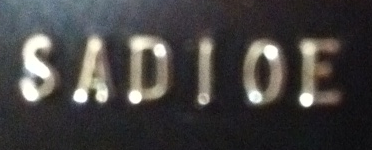Getting help spelling words - Introducing the spell project

When I finally received my credit card after spending an hour spelling every other identifier I had, from my mother’s maiden name to my email address to my SSN,
I was really frustrated to see the cards come in with the wrong name and a facetious first name.
I could easily tell my French accent and the bad quality of the line were to blame for those results.
Determined to get this right, I called back from a better spot in a silent room. This time, the cards came in ok – but my email address got in mangled.
I decided to look into phonetics to spell my name correctly, and being lazy, I looked at how to never have to think about it again.
I took up the say command line from Mac. It tells my name fine, and the -o option outputs a aiff file for it that I could convert back to wav easily.
That solves the French accent issue. But I wanted to make double sure the guy on the other end of the line would get this right.
Next up, I took the nato alphabet and outputted each letter into a separate file. I converted all files to wav.
Bringing it on the interwebs
I created a simple html file that went like this:
The html loads up all wav files using the audio tags, and you play them in the order given by the string you enter in the text input.
The catch in there – and you see the code trying desperately to make up for it – is that the play() method of the audio tag is triggering playing, but returns right away. It’s difficult to catch when the feedback is completed (I didn’t find a way to register an event handler).
So the code is doing a dodgy thing, it’s waiting the length of the sound, plus an extra 200 milliseconds, then plays the next letter.
If there’s a way to listen to the feedback of the audio tag, I would definitely love feedback!
Server-side ruby
So the next best thing to try, put Ruby to work and see how it could combine the sounds to stream them out.
I stumbled into this most excellent blog post that deals with WAV. The goal of the author was to analyze wav files ; it mentioned how to decompose the binary format of a wav file, and the last piece in Ruby showed how to use unpack to read a wav file with a one-liner.
data.unpack 'Z4 i Z8 i s s i i s s Z4 i s*'
I took this Ruby for a spin and I managed to read my wav files and even combine them on the fly.
I put together some minimal code to load all the sounds available in memory, then combine them into the order dictated by the sentence required.
By placing it behind a sinatra app, it should be easy to serve sounds based on strings.
The code is licensed under MIT license, available on github.
Being a week-end rambling, the code comes with no tests, miss support for numbers, and god forbid you use a multi-byte character!
Please feel free to fork it and have fun out of it.
